Live Reporting
- A majority of US states have issued some form of restrictions on businesses in an effort to combat the spread of Covid-19 - but not all of the services deemed "essential" are what you'd expect.In a number of states, including Arizona, Indiana and North Carolina golf courses have been allowed to stay open.Many states where marijuana is legal, including California and Colorado, have marked marijuana dispensaries as essential services.Video game store Game Stop has argued it must keep shops open as it provides items related to remote working.Several craft stores have also decided themselves to be essential businesses. One such company, Michael's, reportedly told employees they were "fundamental" to allowing people "to take their minds off a stressful reality", according to Business Insider.In New Mexico and Florida, liquor stores have also been allowed to keep doors open.Firearm and ammunition retailers are also on more state lists of essential services following a notice issued by the US homeland security agency this weekend that advised gun shops were "critical" businesses.On Monday, Los Angeles County - the most populous county in the US - said it would allow gun stores to stay open during the pandemic due to the Trump administration memo.
- Shortages of personal protective equipment are proving to be a serious problem for healthcare workers on the front line of the battle against coronavirus.One doctor from the UK has come up with a novel solution involving 3D printers.James Coxon is calling on 3D printer owners to use their machines to make face shields for the NHS.His 3DCrowd UK group has already made and donated thousands of 3D-printed masks made by volunteers.“We are basically asking all the people around the country with 3D printers to join our project to create face shields for hospitals and other health workers,” said Gen Ashley from 3DCrowd UK.Read the full story: 3D-printer owners rally to create NHS face masks
- Police in the US have had to deal with some unusual cases as a result of social-distancing guidelines.On Sunday, Chicago police broke up a funeral with between 40 and 60 attendees for breaching the state's stay-at-home order. Police said they witnessed several people drinking from the same cup. Officers said they dispersed the attendees, but did not arrest anyone.Meanwhile, in Florida, police arrested a pastor for unlawful assembly - after he allegedly held two large services, and laid on buses to help attendees get to the church. Police said Rodney Howard-Browne's "reckless disregard for human life" put hundreds at risk.And in Maine, police were called to investigate a particularly extreme case - after local vigilantes allegedly chopped down a tree and used it to block a local resident's road - to stop them from leaving their home. They apparently targeted the person because their licence plates indicated they were from another state. A local politician criticised the actions as "a tremendous waste of resources", adding "now is not the time to develop an 'us vs. them' mentality".
- The spread of coronavirus in a district at the epicentre of Germany’s outbreak will be examined for what scientists have described as a first-of-its-kind study.A team of student researchers, led by a top virologist, will carry out tests in Heinsberg, a district in the western state of North Rhine-Westphalia.As of Tuesday, there were 1,238 confirmed infections and 32 deaths in the district, according to data collected by Germany’s Robert Koch Institute.Heinsberg was among the earliest and most severely affected areas in Germany, leading to comparisons with Wuhan, the Chinese city where the virus first emerged.The purpose of the study is to determine how the coronavirus has spread in the district and which social-distancing measures can most effectively contain it.Professor Hendrik Streeck, the head of virology at the University of Bonn, said the study could be a “big chance for the whole of Germany” and the world.“We’ll be gathering information and practical tips as to how to deal with Covid-19 and how we can achieve further containment of it, without our lives having to come to a standstill over a period of years,” Prof Streeck said during a live-streamed briefing to local politicians.A group of 1,000 people from a village in Heinsberg have been selected to take part in the study, which started on Tuesday morning.The study hopes to offer recommendations on how the German government might handle the coronavirus pandemic in the coming years.Mr Streeck said he was not aware of any similar experiments in other coronavirus hotspots across the world.
- The crisis continues in Italy while Spain passed a grim milestone in its fight against the virus. Here’s the latest from Europe:
- Italy remains the worst affected country in the world. Tuesday's figures show the official death toll rose by 837 deaths to 12,428, more than the 812 recorded on Monday. Moreover, the number of new infections was 2,107, which is greater than the 1,648 the day before (but down from the equivalent numbers last week). All around the country the flag is flying at half-mast to honour the dead
- The death toll in Spain has jumped by 849 in just 24 hours, a new daily record in the country. Confirmed cases have now risen to 94,417, higher than the reported figures from China. Madrid and Catalonia are still the worst hit regions, though cases are also growing in Castilla La Mancha
- France has recorded 499 new hospital deaths in the last 24 hours, bringing the total to 3,523. This is the highest daily rise in such deaths in France since the outbreak began
- A 12-year-old girl has died in Belgium. She is thought to be the youngest Covid-19 victim in Europe. Virologist Emmanuel André was on the verge of tears when he announced her death, saying it was “a rare event and we're very distressed by it". In total Belgium has lost 705 people in the outbreak
- Russia’s parliament has passed an “anti-virus” package of laws in a bid to tackle the crisis. Now, anyone infected who breaks quarantine faces seven years behind bars if others die as a result, while those who spread misinformation about coronavirus could receive a five year sentence
- The captain of a US aircraft carrier is pleading for help amid a Covid-19 outbreak on his vessel.There are more than 4,000 crew members aboard the Theodore Roosevelt and scores have tested positive for the virus - at least 100 sailors, according to the San Francisco Chronicle newspaper."We are not at war. Sailors do not need to die," Captain Brett Crozier wrote in a letter to the Pentagon, adding that the spread was "ongoing and accelerating" and could not be contained.The carrier is currently docked in Guam. Cramped, communal conditions on vessels like the Theodore Roosevelt make it difficult to maintain social distancing measures.A US Navy spokesman told Reuters news agency the service was "moving quickly to take all necessary measures to ensure the health and safety of the crew of USS Theodore Roosevelt".
- UK Prime Minister Boris Johnson has shared a screenshot of what he said was the first ever digital Cabinet meeting.Ministers joined the meeting via video link this morning.And, obviously, it wasn't long before people weighed in with observations on Twitter - noting the Union Jack flag positioned behind International Trade Secretary Liz Truss, and Mr Johnson's appearance after he tested positive for Covid-19 last week."Who's the cabinet minister everyone has to continually scream 'MUTE!!!!!' at?" one Sky News reporter tweetd.If you, like many of us, are just getting to grips with this, here's a light-hearted look at the perils of videoconferencing from our reporter Katie Prescott:
- The UK government is releasing 35 pregnant prisoners and 34 women in mother and baby units from jails in England and Wales.The Ministry of Justice says pregnant women in custody who do not pose a high risk of harm to the public will be temporarily released from prison "within days to protect them and their unborn children from coronavirus".Prisoners in mother and baby units will also be temporarily released with their children.They will be released once they pass a risk assessment and suitable accommodation has been identified.The Ministry of Justice says that as of Monday, 65 inmates had tested positive for coronavirus in 23 prisons while 14 prison staff have tested positive across eight prisons.
- France has recorded 499 new hospital deaths from coronavirus in the last 24 hours, bringing the total to 3,523, its director of health has said. This is the highest daily rise in such deaths since the outbreak began.Health agency director Jérôme Salomon told a news conference that the number of cases had risen to 52,128 from 44,550 in the same period.He said a total of 5,565 patients had been placed in intensive case, a rise of 588 in 24 hours.France is one of five countries, including the US, China, Italy and Spain, to have surpassed the threshold of 3,000 deaths.France is not yet counting deaths outside hospitals, so the total number of deaths could potentially be higher.
- The government of Dubai has announced that it will inject equity into state-owned airline Emirates. The world’s largest long-haul carrier, which has 100,000 employees, has been forced to ground almost all of its flights due to restrictions on travel.Crown Prince Sheikh Hamdan bin Mohammed Al Maktoum cited “its strategic importance to the Dubai and UAE economy, and the airline’s key role in positioning the emirate as a major international aviation hub”. He provided no further details.In other developments in the Middle East:In Israel, the military’s chief of staff, Lt Gen Aviv Kochavi, and two other generals are self-isolating. The military said Gen Kochavi was not displaying symptoms of Covid-19, but that he and the other two officers had attended a meeting on 22 March with a commander in the reserves who later tested positive for the disease.At a virtual meeting organised by Saudi Arabia, finance ministers and central bank governors from the G20 group of major economies promised to address the risk of debt vulnerabilities in low-income countries so they can focus on fighting Covid-19.
Video content
BBC newsreader George Alagiah, who is being treated for bowel cancer, has revealed he has had a mild case of coronavirus."I got a temperature," he told colleague Sophie Raworth. "I’m in the middle of cancer treatment and they always say if you get a temperature, you phone."They did loads of tests. A few days later my oncologist told me you’re fine as far as the chemo side of things are concerned but you do have Covid-19."My first reaction was if that was it, I’ve got away with it because I had a temperature but not all the other nasty things people talk about."Alagiah, who says he feels well although not quite back to normal, hopes his experience can help alleviate other cancer patients' fears of catching the virus."The very fact we’re living with cancer gives us an edge because we've confronted those difficult, dark moments in our lives. In some ways we are stronger because we know what it is like to go into something where the outcome is uncertain."I'm lucky, I had it in a mild way but lots of other people will have it in a mild way too."- The metaphors were mixed but the message was consistent - keep following the rules and stay at home.Prof Powis said that while there may be some positive signs that restrictions on movement are having an impact on the number of cases of coronavirus, it's very early days.Although there were green shoots, he said, we were still in the woods and must not take our foot off the pedal.Any talk of a let-up was premature, cabinet minister Michael Gove said. "It's absolutely not the time for people to imagine there can be any relaxation or slackening."On testing, there was an acknowledgement from Gove that the availability of chemicals was holding up the UK's ability to increase testing.That is a global problem however and does leave the government open to questions about how other countries have been able to implement widespread testing sooner.Even now though, there is clearly capacity to test more people than the UK currently is.Dr Jenny Harries said the capacity was up to 12,700 but figures show in the last 24 hours 8,240 people have been tested.There was more positive news on ventilators, from the government's point of view.Gove was able to point to progress in the manufacture of new ventilators which would "roll off the production line this weekend".They are much needed in hospitals ahead of an expected peak in admissions in the coming week.
- The United States’ death toll from coronavirus is now higher than that of China’s, according to the latest figures from Johns Hopkins University. The US has reported 3,415 deaths, while in China, where the virus originated, the number stands at 3,309.It comes as the country’s leading infectious disease expert says there is a “reasonably good chance” the US will face a second wave of coronavirus later this year.Dr Anthony Fauci, from the National Institutes of Health, said a second wave was likely “given the pervasiveness of this infection and its transmissibility”. But if a second wave does happen, the US "will be much, much better prepared", he added.The US would have better medical equipment and anti-viral drugs and a vaccine may be available by the time a second outbreak occurs, Dr Fauci said in an interview with CNN on Tuesday.The US has 165,874 confirmed cases of coronavirus, the highest number in the world, figures from Johns Hopkins University showed.
- The top court in Colombia has asked the government for its plans on how to protect the country's prisoners from the coronavirus pandemic. The court has given the relevant authorities three days to share the measures they have taken to stop the spread of the virus in Colombia's overcrowded jails. On 22 March, more than 20 inmates died in rioting and attempted break-outs amid rising tension as the number of confirmed cases in the country rose.
- The president of Ecuador, Lenín Moreno, has said that the bodies of those who die in the western city of Guayaquil - a virus hotspot - would be buried "with dignity" in cemeteries. His tweet came after an official said that there were plans underway to build a mass grave. On Monday, Reuters reported that the body of a man was left lying on a pavement in central Guayaquil after he collapsed. The cause of the man's death is not known.
- Mexico has declared a health emergency which will last until 30 April. The move comes after heavy criticism was levelled against President Andrés Manuel López Obrador over his response to the pandemic. The president is one of the few in the region who has not ordered a lockdown. Under the new rules, gatherings of more than 50 people will be banned. Twenty-eight people have so far died after testing positive for the virus.
- Ethiopia has announced that a highly anticipated general election scheduled for August will be postponed because of the pandemic
- Kenya's chief of police has ordered a probe into the killing of a 13-year-old boy, shot dead in a Nairobi slum as a curfew was enforced by police
- Congo-Brazzaville’s former President Jacques Joaquim Yhombi Opango died in Paris from complications related to coronavirus .The family of the 81 year old, who was toppled in 1979, said he had been ill before contracting the virus
- The government in the conflict-hit nation of Somalia has ordered the closure of all religious schools, or madrassas, in an effort to contain the spread of coronavirus and has urged people to pray at home instead of going to mosques for the next two weeks
- Uganda has introduced new restrictions for the next two weeks, including a ban on the use of private cars unless a person has permission from the government
- The southern African nations of Botswana and Mozambique have declared states of emergency as part of measures to curb the spread of the virus. Meanwhile, a night-time curfew was announced in Guinea in West Africa
- Fighting and shelling has continued in Libya’s capital, Tripoli, despite calls for a ceasefire to deal with the pandemic
- South Africa has launched a mass screening programme for coronavirus, with 10,000 field workers to start visiting homes to check for symptoms
- Meanwhile, South Africa, and many countries along the West African coast, are experiencing slow internet speeds because repairs are needed to an undersea cable, which runs from Cape Town to Europe. It is causing lockdown blues for those trying to work from home.
- Australia has reported a drop in the number of new coronavirus cases. Health Minister Greg Hunt told reporters that the rate of growth in new infections had fallen from 25 to 30% last week, to 9% on average over the past three days, according to news agency Reuters. He said it was an "early promising sign"
- Myanmar has recorded its first coronavirus death. The man was 69, and was suffering from cancer, health officials said. The country, formerly known as Burma, has 14 cases so far
- The World Health Organization says it expects the Philippines to ramp up testing after the number of coronavirus-related deaths reached 78. The country has recorded just 1,546 infections so far, with the high death rate appearing to suggest many cases are going undiagnosed
- New at-home blood collection services are being launched in Pakistan after the numbers donating fell due to the coronavirus outbreak. An official at the Fatimid Foundation, which will collect blood at the doorstep, told BBC Urdu it was meant to allow people to donate without leaving home. Pakistan has about 100,000 patients, most of them children, with thalassemia who need blood transfusions every 10 to 15 days
- Answering a question about younger people dying from the virus, deputy chief medical officer Dr Jenny Harries says younger people must also adhere to the social distancing measures.While younger people are in general not having significant, severe cases of coronavirus, "young people can still be affected", she stresses, adding that "it is actually the case with flu, for example, although we don't perhaps communicate that frequently".She adds: "When you're younger you tend not to think of death [or] dying, it's not something that is part of your usual consideration... it is quite easy to think of yourself as not part of the risk."No matter what age you are, you should be staying at home."
- New York Governor Andrew Cuomo has called again for more supplies, a better national strategy to fight Covid-19 and for residents to stay at home."We underestimated this virus. It's more powerful, it's more dangerous than we expected," he emphasised.The state, which remains the epicentre of the outbreak in the US, desperately needs more equipment and staff.Cuomo called for a nationwide strategy where states helped mitigate the peak of the crisis together."Come help us in New York, get the equipment, get the training, get the experience, and then let's all go help the next place," Cuomo said."That would be a smart national way of doing this and showing that unity."He criticised the "inefficient" US process for ordering ventilators, describing it as "being on eBay with 50 other states bidding on a ventilator". He added once the federal government got involved and was bidding, prices continued to go up.The governor also addressed his brother CNN anchor Chris Cuomo's Covid-19 diagnosis."He’s a really sweet, beautiful guy, and he’s my best friend," Cuomo said."There’s a lesson in this. He’s an essential worker...so he’s been out there. If you go out there, the chance that you get infected is very high."Other key updates:
- New York has now reached 1,550 deaths from 1,218 yesterday
- Experts are predicting the peak will be in the next 14 to 30 days
- The state has 75,000 hospital beds in total as hospitals have added to their capacity, but there is an anticipated maximum need of 140,000 at the apex
- The state could need anywhere from 20,000 to 40,000 ventilators depending on the severity of the apex; despite ordering 17,000 from China, Cuomo is expecting 2,500 to arrive due to high global demand
- Cuomo claims the state is leading the nation in developing new medications and therapies
- New York is also working on a new diagnostic test
- Chancellor of the Duchy of Lancaster Michael Gove started by giving an update on the official figures for infections and deaths. He then made a series of announcements:
- He announced that the first thousand new ventilators will come off the production line this weekend
- The government has ordered 10,000 CPAP devices to deliver oxygen before full ventilation is needed
- 1.5 million most vulnerable people are being helped to get food and medicine
- The Army and the RAF are helping the NHS, including flying a critically ill patient from the Shetland Islands to Aberdeen
- He encouraged people to get in touch if they feel they are being made to work in unsafe conditions
- He conceded that the government's testing capacity is being constrained by the supply of specific chemicals, but the government is working with academics and the private sector to increase the number of test centres
NHS England's Stephen Powis gave an update on the medical situation:- NHS Nightingale hospital at London's Excel Centre will be open to patients at the end of the week
- We "should not read too much into" the plateauing of the numbers of new infections
- Experts hope to see a related plateauing of hospitalisation numbers in the next few weeks - there is a lag
- He emphasised that "green shoots" of better news does not mean restrictions can be eased. He said it is vital people continue with social-distancing
- Testing of NHS staff to see who has the virus is being "ramped up" and NHS trusts are drawing up lists of staff to be tested
Gove, Powis and Harries all emphasised that the aim of the policy is to reduce the spread of the virus and keep serious cases within NHS capacity.All three said social distancing had to continue and urged people to comply with the rules.Harries also emphasised that young people are not immune from the serious effects of coronavirus and urged them to stay at home. - The UK government panel is asked whether the NHS, particularly in London, can cope with the surge in the number of patients being admitted to intensive care in recent days.Dr Powis says the NHS is doubling the number of intensive care beds in the capital in response.He says "pressure is building" but the health service has the "headroom and the surgical capacity" to cope at the moment.But he also warns that the NHS' ability to ensure its critical care capacity is not breached depends on the social distancing measures being maintained.

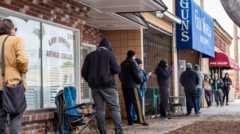
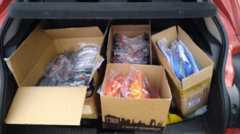
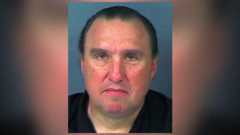
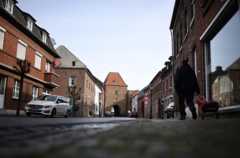
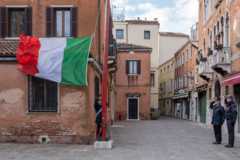




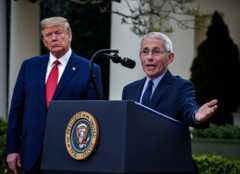
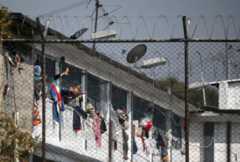
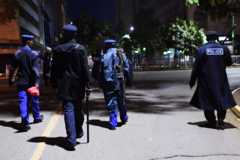
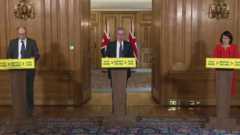
No comments:
Post a Comment